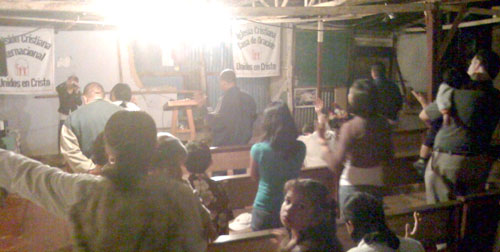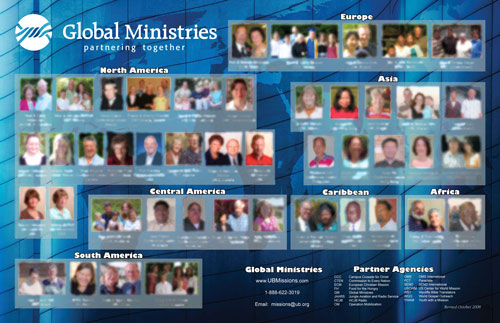20 Jan Report from Costa Rica
16 Jan The Noise Offering for Mattru Hospital
The “Noise Offering” is an interesting fundraiser for some of the upgrades at Mattru Hospital in Sierra Leone. Once a month, some churches take up the Noise Offering. People drop their loose change into a metal container of some kind–a coffee can, pie tin, cake pan–anything that makes a noise. The idea is “Change cane make a change at Mattru.”
Want to join this effort? Just contact Global Ministries.
15 Jan On the Way to Sierra Leone
Six people, destination Sierra Leone, fly out of the airport in Fort Wayne, Ind., this evening around 6 p.m. A predicted blizzard left some doubts about their flight plans, but everything’s sunshiny right now, and they should escape this Hoosier cold spell on time.
They’ll fly to Chicago, meeting up with Robert and Fonda Cassidy, from Mt. Olivet UB church in Mt. Solon, Va. Then it’s on to London, where they’ll meet up with:
- Ken Graham, a retired minister returning from a trip to Israel.
- Mamee Simbo, on her way to join her husband, Rev. Billy Simbo, in Sierra Leone for the next six months.
They’ll arrive in Freetown about 7:30 Friday night, stay in a hotel near the airport, then go up-country to Mattru early Saturday morning.
The group will be in Sierra Leone until January 28. Then a second team will arrive. They’ll all stay in a house directly across from Mattru Hospital.
“Our primary purpose,” says Donna Hollopeter, Associate Director of Global Ministries, “will be medical work at Mattru Hospital, which will include doing daily rounds, seeing patients at the clinic they run daily, doing surgery, organizing the pharmacy, and whatever miscellaneous medical work needs to be done. Then three men will work on gathering information for future construction trips to Mattru to help with upgrades for the rooms and equipment.”
Here are the group members:
- Donna Hollopeter, Associate Director of Global Ministries.
- Jason Hollopeter, pastor of Corunna UB church in Corunna, Ind.
- A former missionary doctor at Mattru.
- Karen Sibery, a staff nurse at Auburn Family Medicine.
- Sharon McDonald, a nurse from Auburn who works at Parkview North Hospital in Fort Wayne. She attends Corunna UB church.
- Ray Proud, a mechanical engineer, going as one of the construction consultant. He is from Corunna UB.
- Robert and Fonda Cassidy, from Mt. Olivet UB, Mt. Solon, Va. Fonda is a nurse, and Robert is going for the construction part. They have previously led trips to Central America.
- Ken Graham, retired pastor from Mainstreet Church in Walbridge, Ohio.
12 Jan Honduras Conference Elects Juanita Chavez
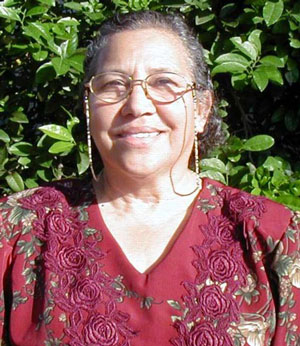
On January 9, Juanita Chavez was elected superintendent of Honduras National Conference. She is the first woman elected to the highest office of any United Brethren national conference.
She succeeds Francisco Raudales, who has held that position since 1996.
Here are some items of interest about Rev. Chavez:
- Juanita was called to the ministry under the preaching of Archie Cameron. At the time, she was attending Ebenezer UB church in La Ceiba, Honduras.
- Juanita was among the first nine students in the Bethel Institute in 1971, and one of the four students in its first graduating class.
- She became director of the Honduras Bible Society in La Ceiba.
- She served Honduras Conference as director of Church Services and as director of the Bethel Bible Institute.
- In 1998, Juanita became pastor of the Ebenezer UB church in La Ceiba.
- Juanita was named one of four outstanding Christian leaders in La Ceiba (Archie Cameron was one of the others).
- Juanita and her husband, Carlos, have been married for nearly 40 years.
Some of Juanita’s story is told in Tio Archie, the story of Archie Cameron and the development of Honduras Conference. Follow the link below for an edited excerpt specifically about Juanita Chavez.
12 Jan Juanita Chavez to Lead Honduras Conference

We have a new Superintendent in Honduras. Juanita Chavez was elected on January 9 during the annual conference. It was a privilege for me to kneel with her at the altar and pray for God’s blessing as she assumes this responsibility.
During the conference a strategic plan was presented and approved that focuses on a number of significant outcomes and indications of church health. Juanita Chavez had a major part in the formation of the plan as a member of the leadership team and so it will be exciting to see her implement it in the coming years.
The conference is very excited to be named host for the 2010 General Conference and some very gifted people have already made themselves available to assist in the planning and preparation.
09 Jan Electing a New Honduran Superintendent
Honduras Conference is meeting right now, and they’ll be electing a new superintendent–possibly today. Francisco Raudales has served in that role since 1996.
Jeff Bleijerveld, Director of Global Ministries, is attending the conference. He’ll be presenting a plaque of recognition and appreciation to Francisco.
05 Jan Guiding Values of Global Ministries
Have you seen the “Guiding Values of Global Ministries“? They are the result of a lot of thought by the Global Ministries Leadership Team. Give it a read. It’ll help you better understand the role, focus, and philosophy or Global Ministries.
23 Dec Free Materials from Global Ministries
Global Ministries cleaned out some old cabinets and came across various printed materials that might interest you. We’re talking coin folders, letterhead, envelopes, and more. These are available for free on a first-come, first-served basis. All you need to do is cover the shipping cost. Check the Global Ministries site for more info.
17 Dec At Work in Sierra Leone
Randy and Toni Fennig have been in Sierra Leone for three months now. Toni has uploaded a lot of photos to her Facebook page. Here are a few.
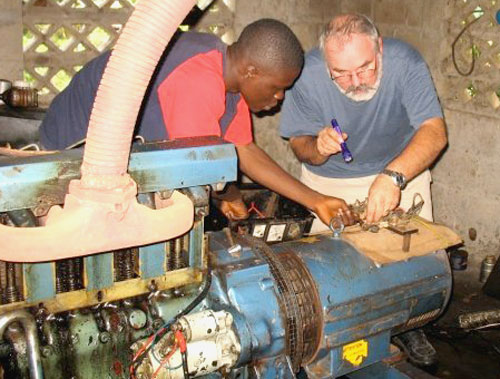
One end of the Bible college campus was without lights for three days…until Randy and a friend got it going again.
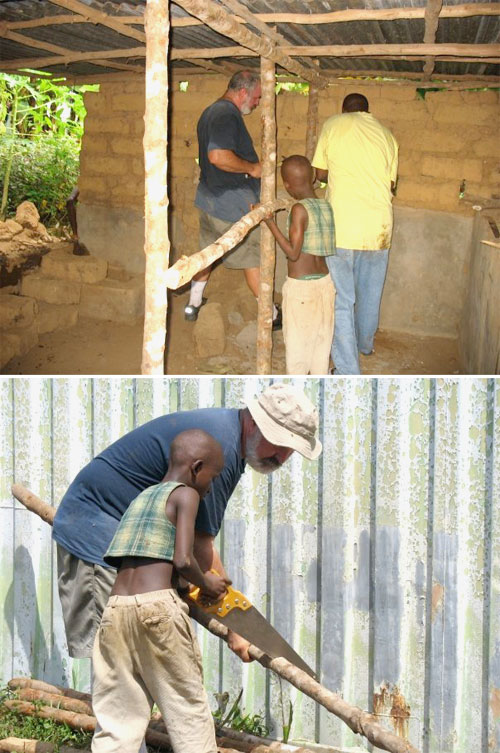
Randy and some Sierra Leoneans built a chicken coop.
12 Dec New Global Ministries Placemat
Hanging on a wall in your church–we hope–is a Global Ministries map showing all of our missionaries and where they serve. We’ve been reprinting the map every year or so, trying to keep up-to-date with our missionaries serving around the world.
Actually, it’s a placemat. It looks good on bulletin boards in church foyers and Sunday school rooms. But the vast majority are used as placemats at church meals. It’s a multi-function piece.
Now we’ve got a new one. It’s not really a map, but does group missionaries according to where they serve (Europe, Central America, Africa, etc.).
This new placemat includes:
- Photos and information about our newest missionaries (for the website, we had to blur some of them for security purposes).
- Updated photos from other missionaries.
- The new Global Ministries logo.
These are free. Just contact Darlene in Global Ministries and tell us how many you want. We’ll ship them right out.
(Yes, the photos in the picture above are blurred. That’s for security purposes. The photos are sharp on the actual placemat.)

